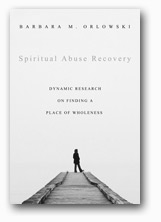 Book Review: Spiritual Abuse Recovery - Dynamic Research on Finding a Place of Wholeness, by Barbara M. Orlowski
Book Review: Spiritual Abuse Recovery - Dynamic Research on Finding a Place of Wholeness, by Barbara M. Orlowski
..................................................
From the book:
I have always believed that conflicts between Christians can be worked through when both parties submit their will to God. Intentional, malicious action against me by a church leader blew me away. The unwillingness of others involved to challenge the leader's actions, but instead look the other way in denial, preserving their positions, shattered my trust in church leadership. [Quoted in Spiritual Abuse Recovery. Taken from the website, Kingdom Grace, 'Shattered Illusions.']
Spiritual abuse is likely to be minimized by those in Christian leadership. However, it is affecting more Christians and churches than people want to admit. Spiritual abuse is causing many very committed followers of Christ to leave abusing churches to seek out other options for Christian community. Barb Orlowski provides a research-based, serious and needed look into the abusive dynamic occurring in many churches.
What is "spiritual abuse?" One definition the author uses is: "Spiritual abuse takes place when leaders to whom people look for guidance and spiritual nurture use their positions of authority to manipulate, control and dominate." Spiritual abuse often occurs when there is a distorted and unbiblical view of leadership authority.
Barb Orlowski outlines distortions and belief systems that contribute to spiritual abuse:
1. Legalism: "When Christians struggle with feelings of shame, of never measuring up, and of feeling like they have to constantly try to earn God's approval, they often do not grasp why their Christian life is so spiritually draining."
2. A Faulty Hermeneutic [a faulty way of interpreting Scripture]: "...makes a person vulnerable to erroneous teachings and the malpractices of controlling leaders."
3. Fully Understanding Healthy Church Leadership: "Developing a biblically-sound understanding of Christian leadership based on Christ's teaching and the New Testament example will create a renewed appreciation for godly leadership expressed in healthy communities."
4. Personal Spiritual and Emotional Injury: "A person's spiritual life has been severly marred by personal injury inflicted by church leadership." Those injured can experience healing and restoration despite the trauma.
Spiritual Abuse Recovery includes the research results of the author's study on the topic. A representative population of actual persons who suffered spiritual abuse were interviewed. Some of the participants' comments read like these:
There was a tremendous dichotomy between what was said by leadership, and the message they actually conveyed. They often spoke of the freedom we have as believers, as well as our individual value in God's eyes. But any attempt to think or act with any degree of freedom was quickly and firmly labeled as unsubmissive to leadership. An overarching theme in most of the subtle messages was that only a few were actually spiritual enough to hear and follow God for themselves, and that everyone else must follow them.
He [the pastor] had left such a trail of hurting and damaged people, and I felt that I could no longer be a part of that type of destruction.
A toxic view of spiritual authority: Orlowski outlines the flaws of bad, unbiblical leadership and delves into the restorative and biblical model of leadership hinted at in the Old Covenant and revealed in Jesus and the New Covenant. This is particularly helpful for those who haven't given the issue much thought. Assumptions can kill, and this book challenges faulty leadership assumptions.
Commenting on her own experience with leadership that wounds, the author says, "Those who had raised concerns were seen as agitators..." Those who have also experienced wounding leadership will agree with her sentiments.
As Barbara Orlowski suggests, even the concept of spiritual abuse can be minimized by those who have never experienced it, or not even on the radar of many Christian leaders. The issue of spiritual abuse needs to be exposed and addressed; and her book capably exposes this critical issue, giving the research results of her study into spiritual abuse.
Those who would most benefit from this book:
.Pastors, church leaders, counselors, and seminary students - who want to know the research behind spiritual abuse and how it affects those who are marred by it. The book also would serve to provide them with a deeper look into biblical authority.
. Anyone interested in a more research-based look at spiritual abuse, that backs up claims of abuse with real data into the victims' of spiritual abuse traumatic experiences.
Author's website: Church Exiters
Amazon link: Spiritual Abuse Recovery - Dynamic Research on Finding a Place of Wholeness
......................................................................................................................................
Reviewed by Jim Robbins, author of Recover Your Good Heart - Living Free From Religious Guilt and the Shame of Not Good-Enough
 Wednesday, January 9, 2013 at 7:20PM
Wednesday, January 9, 2013 at 7:20PM  Jim Robbins
Jim Robbins

















